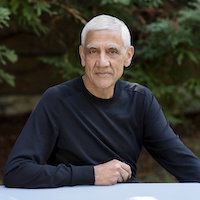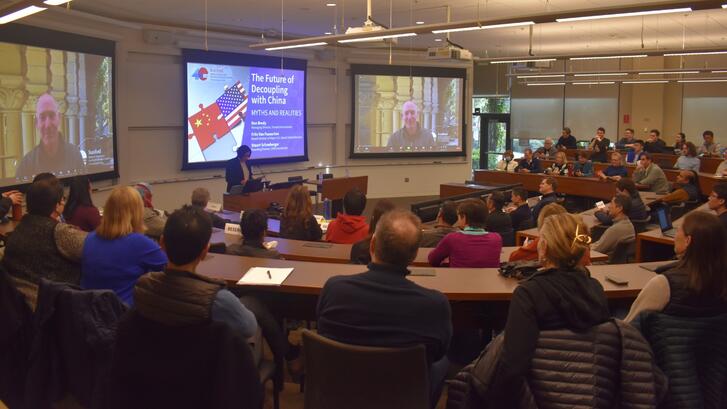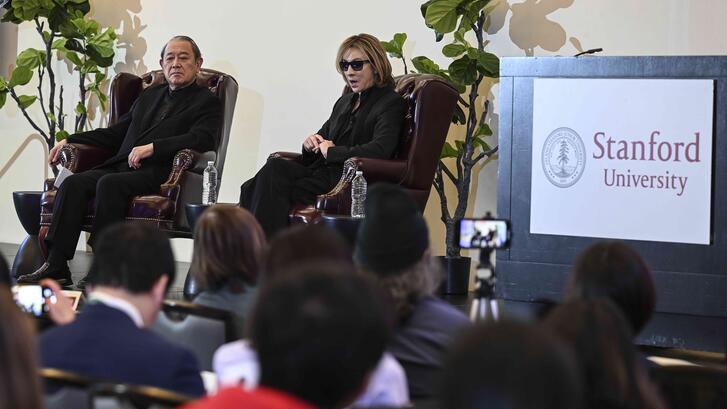Asia-Pacific Energy Challenges and the Role of APEC

This event is part of the series Exploring APEC’s Role in Facilitating Regional Cooperation.
Energy is essential for economic development, but energy use is a major contributor to global warming. Most can agree that transition from fossil fuels to sustainable (green) energy is imperative for long-term sustainability, but how to make that transition while maintaining and increasing growth and prosperity is not self-evident. This panel will examine energy challenges in general, how they play out and are perceived in the APEC region, and how APEC has attempted to find cooperative solutions.
Panelists:

Larry Goulder, Professor in Environmental and Resource Economics, Director of the Stanford Center for Environmental and Energy Policy Analysis, Senior Fellow at the Stanford Institute for Economic Policy Research, Senior Fellow at Stanford’s Precourt Institute for the Environment, Research Associate at the National Bureau of Economic Research; and a University Fellow of Resources of the Future
Lawrence H. Goulder is the Shuzo Nishihara Professor in Environmental and Resource Economics at Stanford University and Director of the Stanford Center for Environmental and Energy Policy Analysis. He is also a Senior Fellow at the Stanford Institute for Economic Policy Research, a Senior Fellow at Stanford's Precourt Institute for the Environment, a Research Associate at the National Bureau of Economic Research; and a University Fellow of Resources for the Future. Goulder's research covers a range of environmental issues, including green tax reform, the design of environmental tax systems and emissions trading policies, climate change policy, and comprehensive wealth measurement ("green" accounting). He has served on several advisory committees to the US Environmental Protection Agency’s Science Advisory Board and the California Air Resources Board, and as co-editor of the Journal of Environmental Economics and Management and the Review of Environmental Economics and Policy.

Larry Greenwood, Chairman of the Board of the Japan Society of Northern California, Senior Adviser at BowerGroupAsia, US Ambassador to the Asia Pacific Economic Cooperation group from 2000-2003
Larry Greenwood is Senior Adviser at BowerGroupAsia, a strategic advisory firm that specializes in the Asia-Pacific. He is also Chair of the Japan Society of Northern California after serving as its President from 2016-2020. From 2011-2015, Larry was Senior Managing Director for Government Relations in Asia for MetLife based in Tokyo responsible for shaping insurance policies and regulations in Asia and from 2006-2011 was Vice President at the Asian Development Bank in Manila, Philippines where he oversaw ADB’s annual loan and grant operations of about $7 billion in East and Southeast Asia and the Pacific Island countries.
Larry was a career diplomat from 1976-2006 where he worked on economic issues in the State Department in Washington, DC and at US Embassies in Manila, Dakar, Singapore and twice in Tokyo. He served as US Ambassador to the Asia Pacific Economic Cooperation group and retired as Deputy Assistant Secretary in the Economic Bureau of the State Department where he was responsible for international financial and development matters. He holds a BA from Eckerd College in St. Petersburg, Florida and an MALD from the Fletcher School of Law and Diplomacy in Medford Massachusetts. He speaks and reads Japanese and French.

Gita Wirjawan, Former Minister of Trade and former Chairman of the Investment Coordinating Board of the Republic of Indonesia, Founder of Ancora Group and Ancora Foundation, Visiting Scholar at Shorenstein APARC
Gita Wirjawan is a visiting scholar at the Walter H. Shorenstein Asia Pacific Research Center, Freeman Spogli Institute, Stanford University. He is the host of a Southeast Asia educational podcast called Endgame, a member of the Board of Governors of the Asia School of Business (MIT Sloan), a member of the international council of the Yale School of Management, and chairman of the Advisory Board of the School of Government and Public Policy (SGPP) Indonesia. While as chairman of Ancora Group, a business group based in Indonesia, he is also a partner at Ikhlas Capital, a Singapore-based Southeast Asia private equity fund. He is also an adviser to a number of Southeast Asia-based venture capital firms, including Alpha JWC Ventures, Monk's Hill Ventures, Jungle Ventures, and Intudo Ventures. He is also a member of the International Advisory Board of Chubb. Previously, he was trade minister and chairman of the Investment Coordinating Board of the Republic of Indonesia during the years 2009–2014, a banker at JP Morgan, Goldman Sachs, and Citibank, and a public accountant. He received his MPA at Harvard University Kennedy School of Government, MBA at Baylor University, and BBA at the University of Texas, Austin.
Moderator:

Thomas Fingar, Fellow at the Walter H. Shorenstein Asia-Pacific Research Center at Stanford University, former U.S. Department of State Assistant Secretary of the Bureau of Intelligence and Research, Deputy Assistant Secretary for Analysis, Director of the Office of Analysis for East Asia and the Pacific, and Chief of the China Division, former Deputy Director of National Intelligence for Analysis, and Chairman of the National Intelligence Council
Thomas Fingar is a Shorenstein APARC Fellow in the Freeman Spogli Institute for International Studies at Stanford University. From 2005 through 2008, he served as the first Deputy Director of National Intelligence for Analysis and, concurrently, as Chairman of the National Intelligence Council. Previous positions include Assistant Secretary of the State Department’s Bureau of Intelligence and Research (2000-2001 and 2004-2005), Principal Deputy Assistant Secretary (2001-2003), and Deputy Assistant Secretary for Analysis (1994-2000). Dr. Fingar is a graduate of Cornell University (A.B. in Government and History, 1968), and Stanford University (M.A., 1969 and Ph.D., 1977 both in Political Science). Recent books include Reducing Uncertainty: Intelligence Analysis and National Security (Stanford University Press, 2011), Fateful Decisions: Choices that will Shape China’s Future (edited with Jean Oi, Stanford, 2020); and From Mandate to Blueprint: Lessons from Intelligence Reform (Stanford University Press, 2021).
For more information about on-campus parking, visit our Contact page.






















